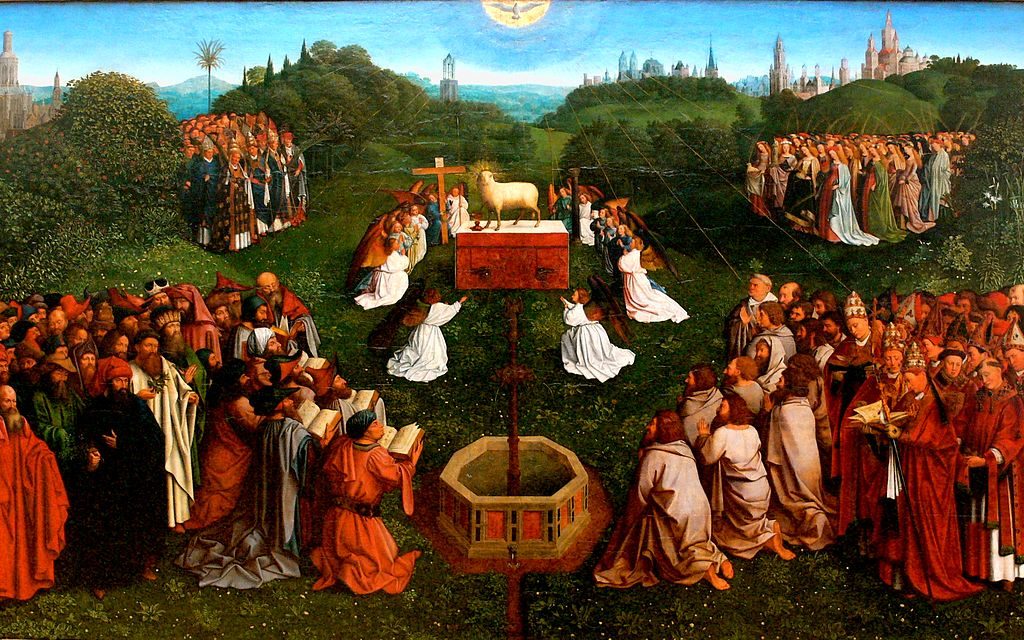The Processional hymn for this Sunday — “Immortal, invisible, God only wise” — is based on I Timothy 1:17: “Now unto the King eternal, immortal, invisible, the only wise God . . . ” The text is by Walter Chalmers Smith (1824-1908), a native of Aberdeen, Scotland, and a minister in the Free Church of Scotland. The tune ST. DENIO is one of the many traditional Welsh ballads which have been adapted to sustain vigorous hymn-singing.
Each Sunday in the Creed, we affirm that Christ is “Light of Light.” In the Bible, the imagery of light is applied both to Christ and to the revelation we receive in Scripture. The first stanza of our Sermon hymn — “O Word of God incarnate” — addresses Christ, the Word incarnate, and thanks him for the gift of the Word written, Holy Scripture, which serves as a “lantern to our footsteps.” The Bible is the Light from the Light of Light. Echoes of the Gospel of St. John (“In him was life, and the life was the light of men”) are thus combined with the imagery from Psalm 119:105, in which the revelation in Scripture is described as “a lamp unto my feet, and a light unto my path.”
The next three stanzas of the hymn develop the imagery of the illuminating power of Scripture for the building up the life of the Church. The author of this poem was William Walsham How (1823-1897), an Anglican deacon, priest, and bishop celebrated for his work with the poor in East End of London. Seven other hymns written by him are included in our Hymnal, the best-known being “For all the saints, who from their labors rest.”
The tune MUNICH dates back at least as far as the late 16th century. In his wonderful oratorio, Elijah, Felix Mendelssohn (1809-1847), this melody is used for the quartet “Cast thy burden upon the Lord.” While this short piece is often sung by entire choirs, it was originally scored for four soloists, as sung below by Henriette Schellenberg, Marietta Simpson, Richard Clement, and Thomas Paul. This is from a 1995 recording of Elijah by the Atlanta Symphony Orchestra and Chorus conducted by Robert Shaw.
The harmonization to MUNICH used in our Hymnal is taken from Mendelssohn’s use of the tune in Elijah.
At Communion, we will sing “Here, O my Lord, I see thee,” one of the five hymns in our Hymnal by another Scotsman, Horatius Bonar (1808-1889).
The text to our second Communion hymn is based on a famous painting by Hubert and Jan Van Eyck, “Adoration of the Mystic Lamb,” commonly known as the Ghent Altarpiece.

Painted in the early 15th century, this majestic work graces the sanctuary of Saint Bavo Cathedral in Ghent. The hymn “The Church of God a Kingdom is” was written by Lionel B. C. Muirhead (1845-1925) in 1898 for publication in a hymnal. Muirhead was a friend of the English poet laureate Robert Bridges, who dedicated one of his collection of poems to him.
Our closing hymn is “Praise to the living God,” one of two paraphrases of a Jewish creed in our Hymnal (the other being “The God of Abraham praise”). That creed, the Yigdal (late 14th century), is traditionally sung at the close of Sabbath services. The tune we sing, LEONI, is named in honor of its transcriber, Meyer Lyon, who in the late 18th century was the chief singer at the Great Synagogue, Duke’s Place, London.
Here is a more literal translation of the Yigdal:
- Exalted be the Living God and praised, He exists – unbounded by time is His existence;
- He is One – and there is no unity like His Oneness – Inscrutable and infinite is His Oneness;
- He has no semblance of a body nor is He corporeal – nor has His holiness any comparison;
- He preceded every being that was created – the First, and nothing precedes His precedence;
- Behold! He is Master of the universe – Every creature demonstrates His greatness and His sovereignty;
- He granted His flow of prophecy – to His treasured, splendid people;
- In Israel, none like Moses arose again – a prophet who perceived His vision clearly;
- God gave His people a Torah of truth – by means of His prophet, the most trusted of His household;
- God will never amend nor exchange His law – for any other one, for all eternity;
- He scrutinizes and knows our hiddenmost secrets – He perceives a matter’s outcome at its inception;
- He recompenses man with kindness according to his deed – He places evil on the wicked according to his wickedness;
- By the End of Days He will send our Messiah – to redeem those longing for His final salvation;
- God will revive the dead in His abundant kindness – Blessed forever is His praised Name.
- These are the thirteen fundamentals, they are the foundation of the religion of God and His faithful. The Torah of Moses and his prophecy is true, blessed for eternity be His Name.